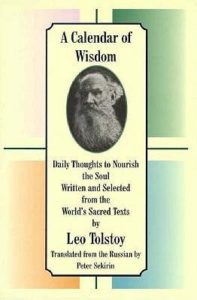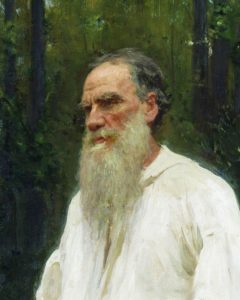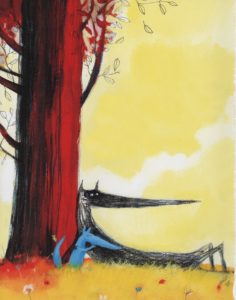Leo Tolstoy on Kindness and the Measure of Love
INSPIRATIONAL, 12 Aug 2019
Maria Popova | Brain Pickings – TRANSCEND Media Service
“Nothing can make our life, or the lives of other people, more beautiful than perpetual kindness.”
 “Practice kindness all day to everybody and you will realize you’re already in heaven now,” Jack Kerouac wrote in a beautiful letter to his first wife and lifelong friend. Somehow, despite our sincerest intentions, we repeatedly fall short of this earthly divinity, so readily available yet so easily elusive. And yet in our culture, it has been aptly observed, “we are never as kind as we want to be, but nothing outrages us more than people being unkind to us.” In his stirring Syracuse commencement address, George Saunders confessed with unsentimental ruefulness: “What I regret most in my life are failures of kindness.” I doubt any decent person, upon candid reflection, would rank any other species of regret higher. To be human is to leap toward our highest moral potentialities, only to trip over the foibled actualities of our reflexive patterns. To be a good human is to keep leaping anyway.
“Practice kindness all day to everybody and you will realize you’re already in heaven now,” Jack Kerouac wrote in a beautiful letter to his first wife and lifelong friend. Somehow, despite our sincerest intentions, we repeatedly fall short of this earthly divinity, so readily available yet so easily elusive. And yet in our culture, it has been aptly observed, “we are never as kind as we want to be, but nothing outrages us more than people being unkind to us.” In his stirring Syracuse commencement address, George Saunders confessed with unsentimental ruefulness: “What I regret most in my life are failures of kindness.” I doubt any decent person, upon candid reflection, would rank any other species of regret higher. To be human is to leap toward our highest moral potentialities, only to trip over the foibled actualities of our reflexive patterns. To be a good human is to keep leaping anyway.
In the middle of his fifty-fifth year, Leo Tolstoy (September 9, 1828–November 20, 1910) set out to construct a reliable springboard for these moral leaps by compiling “a wise thought for every day of the year, from the greatest philosophers of all times and all people,” whose wisdom “gives one great inner force, calmness, and happiness” — thinkers and spiritual leaders who have shed light on what is most important in living a rewarding and meaningful life. Such a book, Tolstoy envisioned, would tell a person “about the Good Way of Life.” He spent the next seventeen years on the project.
In 1902, by then seriously ill and facing his own mortality, Tolstoy finally completed the manuscript under the working title A Wise Thought for Every Day. It was published two years later, in Russian, but it took nearly a century for the first English translation, by Peter Sekirin, to appear: A Calendar of Wisdom: Daily Thoughts to Nourish the Soul, Written and Selected from the World’s Sacred Texts (public library). For each day of the year, Tolstoy had selected several quotes by great thinkers around a particular theme, then contributed his own thoughts on the subject, with kindness as the pillar of the book’s moral sensibility.
Perhaps prompted by the creaturely severity and the clenching of heart induced by winter’s coldest, darkest days, or perhaps by the renewed resolve for moral betterment with which we face each new year, he writes in the entry for January 7:
The kinder and the more thoughtful a person is, the more kindness he can find in other people.
Kindness enriches our life; with kindness mysterious things become clear, difficult things become easy, and dull things become cheerful.
At the end of the month, in a sentiment Carl Sagan would come to echo in his lovely invitation to meet ignorance with kindness, Tolstoy writes:
You should respond with kindness toward evil done to you, and you will destroy in an evil person that pleasure which he derives from evil.
In the entry for February 3, he revisits the subject:
Kindness is for your soul as health is for your body: you do not notice it when you have it.
After copying out two kindness-related quotations from Jeremy Bentham (“A person becomes happy to the same extent to which he or she gives happiness to other people.”) and John Ruskin (“The will of God for us is to live in happiness and to take an interest in the lives of others.”), Tolstoy adds:
Love is real only when a person can sacrifice himself for another person. Only when a person forgets himself for the sake of another, and lives for another creature, only this kind of love can be called true love, and only in this love do we see the blessing and reward of life. This is the foundation of the world.
Nothing can make our life, or the lives of other people, more beautiful than perpetual kindness.
Feast on more of Tolstoy’s deeply nourishing Calendar of Wisdom here. Complement this particular fragment with Albert Einstein on the meaning of kindness, Jacqueline Woodson’s lovely letter to children about kindness, and Naomi Shihab Nye on the remarkable true story behind her beloved poem “Kindness,” then revisit Tolstoy on love and its paradoxical demands, his early diaries of moral development, and his deathbed writings on what gives meaning to our lives.
_______________________________________
 Brain Pickings is the brain child of Maria Popova, an interestingness hunter-gatherer and curious mind at large obsessed with combinatorial creativity who also writes for Wired UK and The Atlantic, among others, and is an MIT Futures of Entertainment Fellow. She has gotten occasional help from a handful of guest contributors. Email: brainpicker@brainpickings.org
Brain Pickings is the brain child of Maria Popova, an interestingness hunter-gatherer and curious mind at large obsessed with combinatorial creativity who also writes for Wired UK and The Atlantic, among others, and is an MIT Futures of Entertainment Fellow. She has gotten occasional help from a handful of guest contributors. Email: brainpicker@brainpickings.org
Go to Original – brainpickings.org
Tags: Leo Tolstoy
DISCLAIMER: The statements, views and opinions expressed in pieces republished here are solely those of the authors and do not necessarily represent those of TMS. In accordance with title 17 U.S.C. section 107, this material is distributed without profit to those who have expressed a prior interest in receiving the included information for research and educational purposes. TMS has no affiliation whatsoever with the originator of this article nor is TMS endorsed or sponsored by the originator. “GO TO ORIGINAL” links are provided as a convenience to our readers and allow for verification of authenticity. However, as originating pages are often updated by their originating host sites, the versions posted may not match the versions our readers view when clicking the “GO TO ORIGINAL” links. This site contains copyrighted material the use of which has not always been specifically authorized by the copyright owner. We are making such material available in our efforts to advance understanding of environmental, political, human rights, economic, democracy, scientific, and social justice issues, etc. We believe this constitutes a ‘fair use’ of any such copyrighted material as provided for in section 107 of the US Copyright Law. In accordance with Title 17 U.S.C. Section 107, the material on this site is distributed without profit to those who have expressed a prior interest in receiving the included information for research and educational purposes. For more information go to: http://www.law.cornell.edu/uscode/17/107.shtml. If you wish to use copyrighted material from this site for purposes of your own that go beyond ‘fair use’, you must obtain permission from the copyright owner.

